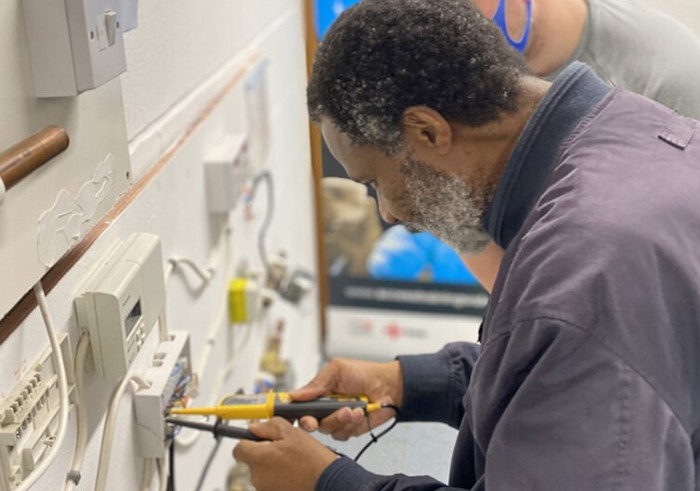Put the spark back into your career; Part P electrician courses are a fantastic way to add electrical work to your toolkit. Whether you’re a plumber, gas engineer, builder or landscape gardener by trade, Part P electrician courses can quickly qualify you to provide electrical work as part of your service. You’ll need to have completed Part P electrician courses if you intend to do electrical work in any of the following:
• Domestic areas (houses, apartments, flats etc.)
• Combined domestic and commercial areas (pubs, shops etc.)
• Common access areas and shared amenities in flats (excluding lifts)
• Outbuildings (sheds, garages etc.)
• Gardens
• Extensions and loft conversions
Of course, without taking Part P electrician courses you can do electrical work but, after you’ve completed it, you’ll need to notify Building Control, organise an inspection and have your work tested and certified. This could cost hundreds of pounds. Meanwhile, if you’re a tradesperson, Part P electrician courses can be claimed against your tax, rendering them free in many cases.
Part P electrician courses can really expand your horizons, and your bank balance! Many jobs that tradespeople carry out in domestic and commercial properties will involve the use of an electrician and, if you’re qualified to carry out electrical work yourself, you’ll be able to make a profit for yourself and a saving (of both time and money) for your client.
The Part P electrician courses offered by our experts at Access will equip you, in just two weeks, to safely and competently handle a number of common electrical repairs and installations. Whether you’re a plumber installing an electrical shower, or a landscape gardener looking to set up garden heaters or lighters, our Part P electrician courses can help you do just that, without the need for an electrician.

Earn more, save time and money and expand your business. Explore our Part P electrician courses today. For more information visit our Part P Course page or call 0800 345 7492 today.
The importance of upgrading much of the UK’s vocational skills and plumbing training has been brought to the fore by City & Guilds, the biggest name in UK vocational education, with two million learners working towards a City & Guilds qualification every single year.
Recently City & Guilds have focussed their attention on Ireland, which is currently lacking in professionally qualified tradesmen and plumbing training graduates to meet the demands of a burgeoning population. In Ireland there is a shortfall in many of the trades, with plumbing training one area where increased participation is being actively encouraged.
A seminar is being organised by City & Guilds to highlight how plumber training and other types of vocational training need to be adapted to take account of emerging technologies and the skill levels required to work with them. There will also be a heavy focus on delivering a more carbon-efficient and environmentally responsible service.

At the seminar the City & Guilds will launch its new range of qualifications which aim to marry traditional vocational courses such as plumber training with emerging technologies which are geared towards sustainable energy and resource management.
As well as gearing traditional qualifications such as plumbing training towards future sustainability, City & Guilds are also introducing an entirely new range of qualifications which ensure a workforce will be in place to deal with the adverse effects of climate change which are increasingly coming to the fore. Such qualifications will include the operation of snow and ice clearing machinery.
Speaking before the seminar, Brid Healy, Country Manager of City & Guilds Ireland, said: “There has been much high-level and general discussion about the potential green wave of jobs which will emerge as Ireland looks to more sustainable development. However, the role that plumber training and vocational skills will play in delivering a sustainable future has not received much airing. Tomorrow’s seminar is about putting the issue of skills in our future development at the heart of policy conversations.”
If you’re looking for plumbing training courses which have one eye on the future, contact Access Training today. Our plumbing training courses have pass rates which represent some of the highest in the country. Call 0800 345 7492 for further information about our wide range of plumbing training courses.
If you are considering training to be a plumber or vocational training more generally, the news that the planned overhaul of the UK’s vocational educational system has come unstuck will pique your interest. Following the damning Wolf review of vocational courses, the minister of education, Michael Gove, promised a thorough overhaul of the system and the QCF (Qualifications and Credit Framework). The aim of this new framework was to:
- Set a country-wide standard for vocational training, ensuring the high standard of education across the UK;
- Establish levels and gradings across the vocational system to monitor progress and gauge achievement;
- Integrate the vocational system with the current academic system, allowing vocational courses a points system which would function as a comparable equivalent.
Unfortunately, for those considering training to become plumber, or establishing themselves into any sort of trade, these changes have foundered utterly and have folded a month before their due completion.
The issue with courses for those interested in training to be a plumber is the hundreds of courses out there which all function in different ways. This makes bringing them all up to a general standard and implementing a thorough, water-tight framework exceedingly difficult. In fact, the whole doomed QCF process has been described as “expensive spaghetti”!
This failure won’t make much difference to those training to be a plumber. Changes are yet to be made and very few training providers are ready for them when they are eventually implemented. They are unlikely to affect those currently training to become a plumber.
In the future, if you are thinking about training to be a plumber, you can expect a more thoroughly regulated system of vocational training with relative values and a clear framework. The industry qualifications you’ll earn, however, will stay the same.
These changes seem to be a fair way off still but, when they are implemented, Access Training are ready to make the change, ensuring quality and consistency across the vocational training courses we offer. If you’d like to find out more about training to be a plumber with industry experts, just take a look at the flexible and varied courses available on our website, or call our team on 0800 345 7492 today.
Whether you are a first-time property developer or a veteran, plumbing courses and other vocational courses can save you a lot of money when refurbishing your property. By learning hands-on skills you can save money not only on labour but also by ensuring work is carried out properly, to the correct time-scale and to a fair budget.
Plumbing courses can be taken at a number of different levels, so whether you only know a little or already know a lot, you can add to your skills. Essentially, for property developers, vocational and plumbing courses are an investment in skill. Over time, the savings you will make on labour and on will accumulate; you could soon stand to save an awful lot of money, especially if you see property development as a long term ‘career’.
The problem is, the property market is no longer what it once was. Property developers do not have unlimited funds to throw at a building and still see a return on their investment. This means that plumbing courses, and other practical courses, are more important than ever before. Being canny and in the know about the trades will allow you to make informed decisions about your overhaul of your properties.

Plumbing courses could also save you money if you are simply developing your own property. Renovating an old, tumbledown place can be a very cheap way of find your footing on the property ladder, but if you don’t know your way around the plumbing and fall prey to an unscrupulous plumber, it could be even more expensive then purchasing a brand new property.
To find out about Access Training’s plumbing courses or other vocational courses browse the rest of the website. We offer flexible plumbing courses to suit all levels, all abilities and all timescales. To speak to one of our knowledgeable staff call 0800 345 7492 today.

Whether you’re just starting out on your career, or are looking to quit your current job and retrain, you'll be pleased to know that there are plenty of different types of electrician! Let's take a look... More...
If you are looking to leave the army and start a new career, you’ll need a whole new skill set. You’ll probably have heard about ELCs (Enhanced Learning Credits), IRTC grants (Individual Resettlement Training Cost), GRT (Graduated Resettlement Time) and a whole host of other three letter acronyms. But what does it all mean and how can you use all of these resources to start a new career and a new life after leaving the armed services?
Over the next few weeks we’ll be looking at retraining in trades for ex-services personnel, so keep your eyes peeled for our blogs and articles aimed at getting you the best training and making the most of the excellent retraining resources the army supplies. In this article we’ll be looking at exactly what ELCs, IRTC grants and GRT are and how you can use them to learn a trade in preparation for your civilian life.
What are Enhanced Learning Credits (ELCs)?
ELCs or Enhanced Learning Credits are a form of financial support for servicemen and women who want to take up further education or retrain in a new profession when they leave the army. Here are the key things you need to know about ELCs:
1. ELCs are available for three separate years; these years do not have to be consecutive and can be used at any point in the decade after you have left the army.
2. There are two levels of ELCs. The lower level entitles you to £1,000 per year, which can be claimed after four years of service. The higher level entitles you to £2,000 per year and is available after eight years of service.
3. All courses your ELCs are spent on must be delivered by an authorised provider and must be a nationally recognised level 3 qualification or above. This may include but is not limited to:
• Overseas qualifications
• Postgraduate qualifications
• Foundation degrees
• Vocational training
• Other academic qualifications
4. ELCs cannot be used to pay for books and materials, travel, accommodation and food required during the training. However, IRTC grants can be used for these purposes and can be used at the same time as your ELCs. Read more about this below.
What are Individual Resettlement Training Cost (IRTC) Grants?
IRTCs or Individual Resettlement Training Costs are another form of financial support for ex-army personnel who want to retrain or get back into education after six years of service. Many people do not realise that IRTCs can be used at the same time as ELCs, but in fact this is a very good way of making the most of your allowances and resources.
IRTC grants are tax-free and entitle you to £534 to be spent on an approved course. A further benefit of £80 a day can be provided to be spent on accommodation and an added £25 can be given to spend on daily food requirements.
Because the yearly £1,000-£2,000 ELCs (Enhanced Learning Credits) are not always enough to cover the cost of a quality, nationally approved training course, many training providers will provide both food and accommodation along with the one-off £534, and use the surplus accommodation and food allowances to cover the rest of the courses cost. This makes great training courses affordable for ex-servicemen and women and keeps them fed and housed for the duration too.
This combination of ELCs and IRTCs is not handled by all training providers but there are a number of excellent vocational training providers, Access included, who are highly-rated by the army because they do a brilliant job of retraining ex-army personnel in this way.
What is Graduated Resettlement Time (GRT)?
Graduated Resettlement Time (GRT) is leave allowance given to army personnel which they can use to prepare for life outside the army. Depending on your years of service, you will be entitled to a different number of GRT days.
No GRT is allotted to military personnel who have been serving for less than six years. After six years the time allotted is as follows:
| Years of Service1 |
GRT Days Allotted |
| 6+ Years |
20 Days |
| 8+ Years |
25 Days |
| 12+ Years |
30 Days |
| 16+ Years |
35 Days |
If you have to leave the army on medical discharge your GRT days are more generous and start from your very first year of service.
So What’s Next?
Now you know the basics about how the key army resources for retraining can fit together, you now need to decide what you want to do and put all this information into practice. Many ex-servicemen and women take up a trade after leaving the army; to do this you will need to train in your chosen field. Access is a vocational training provider with close links to the services. We allow you to use your ELCs and IRTCs to their full advantage whilst the flexibility of our courses allows you to use your GRT to learn in tandem with your current career.
To learn more about the huge range of vocational courses that Access provide for servicemen and women, visit the rest of our website or call one of our experienced and knowledgeable team on 0800 345 7492 today, and take the first step on your brand new career ladder!
This week the news that 1 in 10 students are reconsidering going into higher education thanks to uncapped and unaffordable tuition fees has thrown light on vocational choices like plumbing courses. A stunning two thirds of students who are considering going to university would now also consider doing vocational courses, such as plumbing courses, instead!
This shouldn’t really be news, yet people still seem to be shocked by it. Plumbing courses are looking like an increasingly smart option to youngsters thanks to a combination of excellent prospects, unaffordable student loans, high graduate unemployment and a general sense of dissatisfaction with the state of academia in the UK.
Plumbing courses give young people real prospects and the ability to start earning a very good wage, in a very good job, very quickly. The alternative is three years of (sometimes sub-par) teaching, a piece of paper, a lot of debt and no promise of prospects.
It used to be thought that anyone who wanted to get into a good, satisfying and well-paid profession would need a university degree. But, as graduate unemployment starts to look like a real problem, the smart money is now in plumbing courses. The UK has a huge number of highly academically educated youngsters but alarmingly few young people educated in skilled labour. Plumbing courses are now seeking to readdress this balance.
If you are interested in the money and job satisfaction that plumbing courses could set you up for, get in touch with us here at access. Every day new students, young and old, experienced and completely new, sign up for our plumbing courses to start their journey to a brighter future in plumbing! Call our friendly team on 0800 345 7492 now for more information and advice about how to get where you want to go with plumbing courses!
If you are thinking about jacking in your plumbing training it could be the worst thing you do for your career. The net is closing in on unscrupulous and untrained trades people including plumbers, electricians, general builders and carpenters. The CITB and the Government are joining forces to push for a greater level of scrutiny when it comes to the levels of workmanship carried out by these and other trades. Starting with training and qualifications, they are insisting that trades people obtain key qualifications that are recognised in their industry. Plumbing training has particularly come under fire with rogue traders being punished in the severest way possible.
In a copy of the Construction Engineer dated 24th June 2011, it was reported how Darryl Sylvester Glyn, 46, was ordered to pay back over 100K to his customers or he would face an additional two years in jail. He is already spending four years in jail having been prosecuted by Yorkshire County Council Trading Standards.
Whilst there are many honest and reliable trades people operating in the UK, there are many rogue traders who think nothing of demanding large amounts of money from their customers and doing very little in return. Jobs are left unfinished, money runs out, more money is demanded, and the cycle continues all at the detriment of the customer. This has got to stop and training seems to be the key lacking factor when it comes to these dodgy dealings. If these trades people had to demonstrate their qualifications whether in plumbing training or another trade, they would fall short of the mark and the customer would not choose them for the job in hand.
Established courses in plumbing training, carpentry training and other trades ensure these trades people have the skills and knowledge they need to do a good job and to follow best practices. The good news is that more and more trades people are stepping up to the mark and ensuring that their training is up to date and that they can prove they are able to carry out high quality work.
Plumbing training is just one direction you can take if you are interested in learning a trade. You can learn so much through an accredited course and diversify into specialist areas that will make you stand out from the crowd.
There are many training companies offering outstanding plumbing training these days. You can take any number of courses to get yourself established in the industry or to further your current knowledge and skills. Browse our range of brilliant plumbing training courses on our website now, or call our helpful team on 0800 345 7492 for more information!
The introduction of vocational lessons for less academic students has been hailed as a very good thing for education. Nowadays school children can be taught horticulture and can undertake training to be a plumber, and much more. Training to be a plumber at a young age is a great way to get experience is a good business and a fulfilling profession, but the recent Wolf Review which monitored vocational training to be a plumber among other courses, found real shortcomings in vocational education.
Vocational Course Problems
The problems that the Wolf Report identified with vocational training to be a plumber at school include a lack of real value. In many cases, vocational courses which were supposed to provide children with training to be a plumber did not prepare their students thoroughly enough for higher education or for a real job.
Training to be a plumber at school is often equivalent to several GCSE but does not provide students with the right level of skill to account for this. This means that, after undergoing training to be a plumber, school leavers often find that there is no job for them and they are woefully under-prepared for further education.
Why Do These Problems Arise?
The key reason that so many courses which provide training to be a plumber to school kids are so useless is that there is a severe lack of regulation. There is no single, dedicated body which controls the standard of training to be a plumber. This means that, while there are many fantastic vocational plumbing courses around, there are equally training courses which underprepare students and do not fulfil the needs of their students.
Get High-Quality Training to Be a Plumber
There are many proposed changes to school training to be a plumber. The Wolf Report suggests that many of the underperforming courses are immediately scrapped. Meanwhile, the report proposes making further education (FE) courses available to vocational secondary school students who want training to be a plumber.
If vocational plumbing courses are scrapped at secondary schools, students may have to wait until their leave school to get training to be a plumber. This may not be so terrible a thing. There are lots of brilliant plumbing training courses out there and adult training is monitored by awarding bodies such as City & Guilds so their quality and standard is assured.
If you are interested in training to be a plumber, whether you are a school leaver or not, you can enrol on our plumbing training courses which can be found UK-wide. Our courses are flexible, City & Guilds accredited and taught by experienced professionals. To learn more about training to be a plumber with Access Training, browse our site or call our team on 0800 345 7492 today.